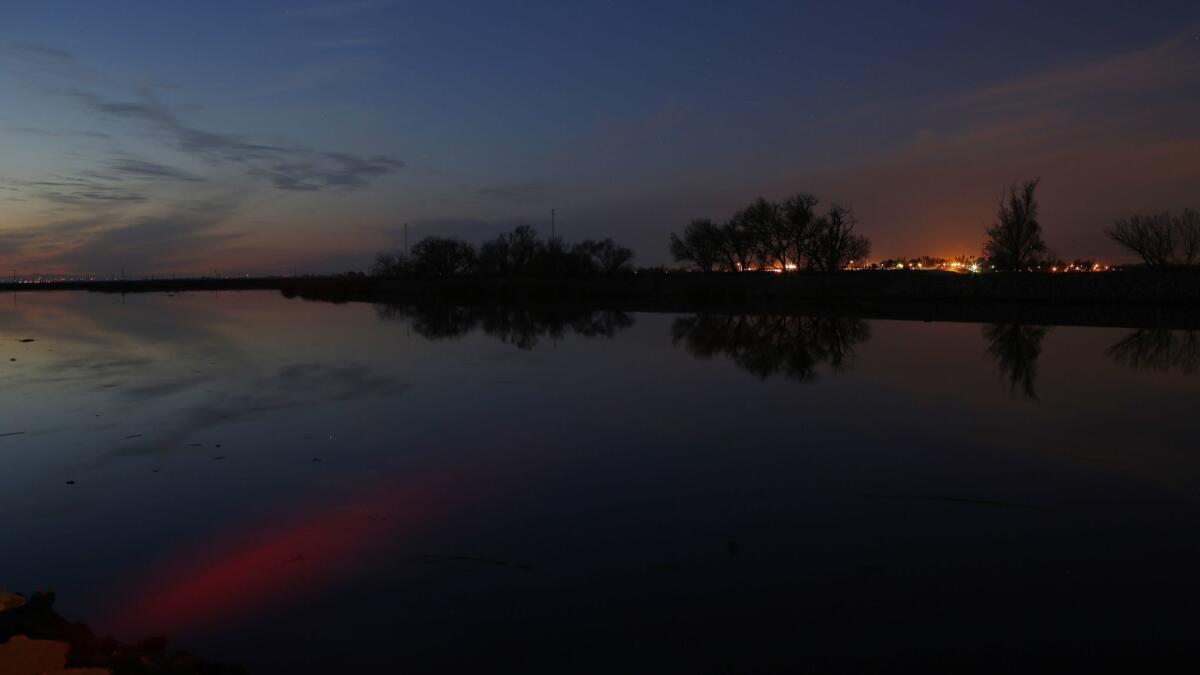Southern California might foot the bill for delta tunnels project — with no promise of reimbursement

- Share via
Southern California’s biggest water agency is considering picking up most of the bill for overhauling the state’s waterworks without any guarantee that it will eventually recoup its additional, multibillion-dollar investment.
At a board workshop Tuesday, officials of the Metropolitan Water District of Southern California outlined ways in which the agency could finance the construction of two giant water tunnels under the Sacramento-San Joaquin Delta.
Underlying the plan is an assumption that the San Joaquin Valley agricultural districts that have refused to share in the upfront costs of the mammoth construction project would be willing to buy into it when the project is finished.
But those big irrigation districts have yet to commit to future water purchases, leaving open the possibility that the MWD — and by extension ratepayers from Los Angeles to San Diego — will be stuck with a roughly $11 billion bill for the project known as California WaterFix.
The MWD’s board voted last fall to invest $4.3 billion in the twin tunnel project, which proponents say is necessary to sustain water deliveries to San Joaquin Valley agriculture and Southland cities.
But after valley growers said they couldn’t afford the project, the state decided to press ahead with a less costly, one-tunnel version financed by the MWD and the other, largely urban districts that get delta supplies from the State Water Project.
Not long after the state’s February announcement, some MWD board members floated an idea to keep alive the two-tunnel version, which they believe would be more beneficial. They proposed that the MWD pick up agriculture’s unfunded portion, which amounts to roughly a third of the project’s total $17-billion cost.
Under the scenario outlined by MWD staff Tuesday, the agency would recover that extra investment by selling tunnel capacity to agricultural irrigation districts when WaterFix is built.
The supposition is that once supplies start flowing through the tunnels, the project will be more attractive to growers who by then will also be facing new limits on groundwater pumping they traditionally rely on to carry them through droughts.
“Their problem is cash flow” during the years of construction, MWD Assistant General Manager Roger Patterson told the board.
He added that the MWD is hoping those districts will soon sign purchase agreements that bind them to future buy-ins.
But it’s unlikely growers will do that before the board votes on whether it should more than double its investment in WaterFix.
The staff is planning to offer two options for a board vote next month: Add $1 billion more to the MWD’s 2017 funding commitment and move ahead with one tunnel, or throw roughly $5.5 billion more into the WaterFix pot and build two tunnels. The latter would push the agency’s total financing to nearly $11 billion.
If the MWD is unable to eventually sell that extra project share, WaterFix would add nearly $60 a year to household water costs in the agency’s service area, according to staff calculations. Paying for one tunnel would increase annual household bills by half that amount.
Financing WaterFix to the tune of $11 billion would also have twice the effect on the agency’s overall budget, increasing it by 2.2% a year, compared with 1.1% for one tunnel.
Board members peppered the staff with questions about contract details and how the MWD’s investment would be protected.
The most skeptical members were from Los Angeles and the San Diego County Water Authority. Mayor Eric Garcetti, who appoints L.A.’s representatives, last year said he supported one — but not two — delta tunnels.
Board Vice Chairman John Murray Jr. of Los Angeles noted that city policy calls for L.A. to reduce its use of imported water and boost local supplies, such as recycled water. Others wondered if paying so much for WaterFix would decrease investments in developing alternative sources.
MWD officials have said that Southern California needs to both maintain its delta imports and develop regional supplies, adding that the agency will continue to subsidize local programs.
In public comments, opponents repeated arguments against the tunnels. MWD’s billions would be better spent developing regional water sources, they said. The project will drive up water rates. And they accused MWD of cherry picking data to exaggerate projected tunnel deliveries.
Murray also noted that some water experts say a second tunnel is not worth the extra cost since one tunnel would provide many of the same benefits as two. The project is intended to lessen the ecological harm of massive withdrawals from the delta’s southern portion by partially supplying delta pumps with tunnel water diverted from the Sacramento River in the delta’s northern reach.
Patterson disagreed that one tunnel was enough. “I don’t think one does the job of two,” he said after the workshop.
Two tunnels, he said, would provide more flexibility in operating the big government projects that export water from the delta, would be able to capture more water during storm flows and would do more to lessen the harmful environmental effects of the delta operations.
Twitter: @boxall
More to Read
Sign up for Essential California
The most important California stories and recommendations in your inbox every morning.
You may occasionally receive promotional content from the Los Angeles Times.














